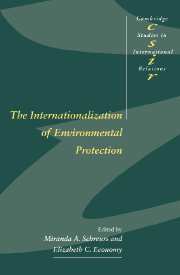Book contents
- Frontmatter
- Contents
- List of contributors
- Preface
- 1 Domestic and international linkages in environmental politics
- 2 Chinese policy-making and global climate change: two-front diplomacy and the international community
- 3 The domestic politics of global biodiversity protection in the United Kingdom and the United States
- 4 Domestic and international linkages in global environmental politics: a case-study of the Montreal Protocol
- 5 The internationalization of environmental protection in the USSR and its successor states
- 6 Domestic institutions and international environmental agendas in Japan and Germany
- 7 Zimbabwe and CITES: illustrating the reciprocal relationship between the state and the international regime
- 8 The European Union: bridging domestic and international environmental policy-making
- Index
- CAMBRIDGE STUDIES IN INTERNATIONAL RELATIONS
5 - The internationalization of environmental protection in the USSR and its successor states
Published online by Cambridge University Press: 08 March 2010
- Frontmatter
- Contents
- List of contributors
- Preface
- 1 Domestic and international linkages in environmental politics
- 2 Chinese policy-making and global climate change: two-front diplomacy and the international community
- 3 The domestic politics of global biodiversity protection in the United Kingdom and the United States
- 4 Domestic and international linkages in global environmental politics: a case-study of the Montreal Protocol
- 5 The internationalization of environmental protection in the USSR and its successor states
- 6 Domestic institutions and international environmental agendas in Japan and Germany
- 7 Zimbabwe and CITES: illustrating the reciprocal relationship between the state and the international regime
- 8 The European Union: bridging domestic and international environmental policy-making
- Index
- CAMBRIDGE STUDIES IN INTERNATIONAL RELATIONS
Summary
Until its collapse in 1991, the USSR was one of the world's most heavily industrialized countries, and one of its largest producers of environmental pollution. Yet despite the USSR's enormous scientific and technological prowess, and its leaders' often professed commitment to human health and welfare, Soviet environmental policies stubbornly lagged behind those in Western Europe and North America – a gap that steadily widened throughout the course of the 1970s and early 1980s. When the Soviet regime finally joined its predecessors on the dustheap of history, this distinction was passed on to its successor states – heirs not only to an environmental crisis of almost unimaginable proportions, but also to the facilities and practices that had generated that crisis in the first place.
This environmental crisis threatened not only the citizens of the USSR itself, but also their neighbors abroad. Even though the vast inner spaces of the USSR could contain environmental problems that would quickly have attained trans boundary dimensions elsewhere in the world, a significant portion of the air, water, and radioactive pollution generated within the Soviet Union inevitably crossed its outer borders – whether in a slow steady trickle, or in sudden explosions like the Chernobyl disaster. Indeed, long before the Chernobyl accident, environmental specialists and officials in northern and western Europe recognized that they could not solve their own environmental problems without the cooperation of the USSR and its socialist allies. Accordingly, Western scientists and diplomats labored to persuade the Soviet government to adopt more vigorous policies towards environmental protection.
- Type
- Chapter
- Information
- The Internationalization of Environmental Protection , pp. 97 - 133Publisher: Cambridge University PressPrint publication year: 1997
- 7
- Cited by



